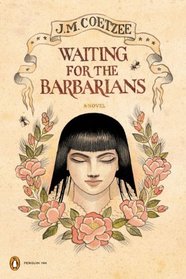His prose is great; real English. Unlike Paton and Gordimer, he actually uses quotation marks. But for the story. It's narrator is a magistrate at a rural settlement who hopes to retire before the real trouble starts; not unlike our politicians and business gurus. The setting is supposedly South Africa where the {evil} Empire awaits an uprising of the nomadic tribesthe barbarians. The first two parts dwell on the Empire's use of torture and the narrator's sexual habits, most of which occur in the mind of the reader. Frankly, it became quite tedious. Part three is a pre-spring trek to the nomadic lands, rather reminiscent of something from Jack London. In part four the narrator is imprisoned and undergoes the tortureso realistic this time that I might be reading Darkness At Noon, or an escapade of Torquemada. For the remainder of the novel the barbarians seem to be wining and the settlement waits for the other shoe to drop leaving me with mixed emotions about the book.
One man's struggle with what it means to be a civilized man and do the moral thing.





![header=[] body=[Get a free book credit right now by joining the club and listing 5 books you have and are willing to share with other members!] Help icon](/images/question.gif?v=3bd077e6)
